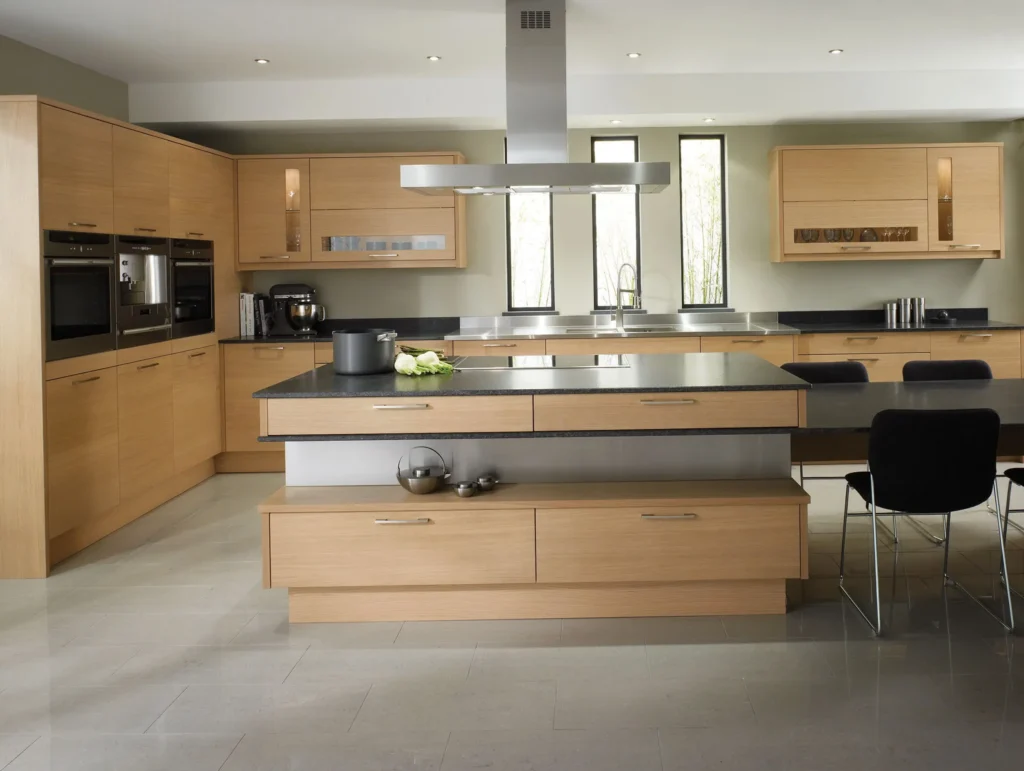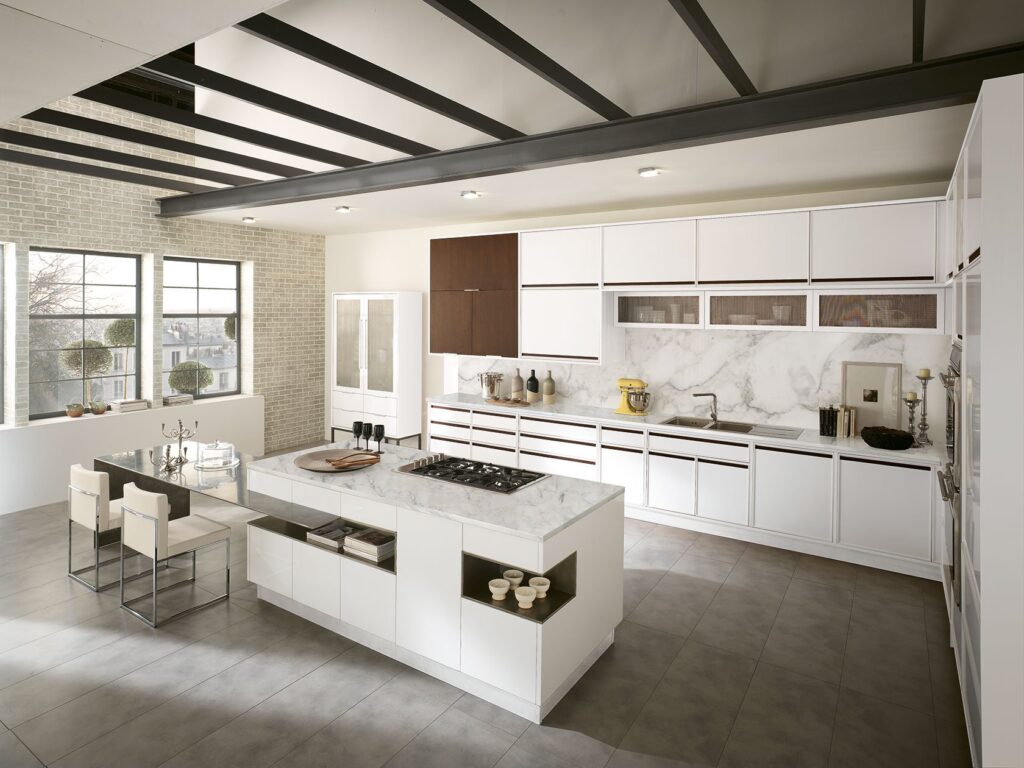Designing a kitchen is more than just choosing cabinets and countertops; it’s about creating a space that combines functionality with aesthetic appeal. Whether you’re renovating an existing kitchen or starting from scratch, a kitchen design consultancy can be invaluable in helping you navigate the complexities of layout, materials, and style. In this comprehensive guide, we’ll explore everything you need to know about kitchen design consultancy, from understanding the process to tips on finding the right consultant for your needs.
Page Contents
Introduction to Kitchen Design Consultancy
When embarking on a kitchen renovation or new build, many homeowners turn to kitchen design consultancies for expert guidance. These consultancies specialize in creating functional and visually appealing kitchens tailored to individual needs and preferences. They offer a range of services, from initial concept development to the final installation, ensuring every aspect of your kitchen is carefully planned and executed.
What is Kitchen Design Consultancy?
Kitchen design consultancy refers to a specialized service provided by professionals who assist homeowners, architects, or developers in designing and planning kitchens. This consultancy typically involves experts who have a deep understanding of spatial layout, interior design principles, building codes, and product knowledge related to kitchen fixtures, appliances, and materials.
Key Aspects of Kitchen Design Consultancy:
- Expertise and Knowledge: Consultants bring expertise in kitchen design principles, such as ergonomic layouts, efficient use of space, and knowledge of the latest trends in materials and technology.
- Customization: Consultants work closely with clients to understand their needs, preferences, and lifestyle requirements. They tailor designs to ensure that the kitchen not only looks aesthetically pleasing but also functions seamlessly.
- Project Management: Beyond design, consultants often oversee the entire project, including procurement of materials, coordination with contractors, and ensuring timelines and budgets are adhered to.
- Collaboration: Good consultants collaborate closely with clients, architects, interior designers, and contractors to ensure that the kitchen design integrates smoothly with the overall architectural vision of the space.
- Problem Solving: Consultants are skilled in problem-solving, addressing challenges such as spatial constraints, integrating new technologies, or adapting designs to meet specific accessibility needs.
Services Offered by Kitchen Design Consultants:
- Initial Consultation: Discussing client needs, preferences, and budget constraints to establish project scope.
- Conceptual Design: Developing initial layout plans, 3D renderings, and mood boards to visualize the design direction.
- Detailed Design: Refining the layout, specifying materials, finishes, appliances, and fixtures that align with the client’s aesthetic and functional requirements.
- Procurement and Installation: Managing the procurement process, coordinating deliveries, and overseeing installation to ensure quality craftsmanship and adherence to design specifications.
- Post-Installation Support: Providing guidance on maintenance, warranties, and resolving any issues that may arise after the completion of the project.
Benefits of Hiring a Kitchen Design Consultant:
- Expert Advice: Consultants offer professional advice based on their knowledge and experience, helping clients make informed decisions.
- Customization: Designs are tailored to individual preferences, ensuring a unique and personalized kitchen space.
- Efficiency: Consultants streamline the design and construction process, saving time and minimizing potential costly mistakes.
- Quality Assurance: They ensure that materials and workmanship meet high standards, enhancing the longevity and functionality of the kitchen.
- Value Addition: A well-designed kitchen can increase the value of a home and enhance its appeal to potential buyers or tenants.
Why Hire a Kitchen Design Consultant?
- Expertise: Consultants have in-depth knowledge of materials, layouts, and trends.
- Personalized Solutions: They tailor designs to your lifestyle and preferences.
- Project Management: They oversee the entire process, ensuring seamless execution.
- Access to Resources: Consultants have access to suppliers and tradespeople, streamlining the process.

The Consultancy Process Explained
Understanding the kitchen design process can help you better collaborate with your consultant and achieve the kitchen of your dreams. This chapter breaks down the typical steps involved in kitchen design consultancy.
Initial Consultation
- Purpose: Discuss goals, budget, and preferences.
- Outcome: Establish project scope and timeline.
Design Development
- Conceptualization: Create layout and design options.
- Detailing: Select materials, finishes, and fixtures.
Review and Refinement
- Feedback: Client review and adjustments.
- Finalization: Refine design based on feedback.
Procurement and Installation
- Ordering: Place orders for materials and products.
- Construction: Coordinate with contractors for installation.
Completion and Handover
- Inspection: Ensure quality and functionality.
- Handover: Final walkthrough and project completion.
Key Elements of Kitchen Design
A well-designed kitchen integrates practicality with aesthetics. Here’s a look at essential elements your consultant will consider:
Layout: Optimal use of space considering workflow and traffic flow.
Storage: Efficient storage solutions like cabinets, drawers, and pantry spaces.
Countertops: Durable materials such as granite, quartz, or butcher block.
Appliances: Selection based on cooking habits and energy efficiency.
Lighting: Task lighting for work areas and ambient lighting for ambiance.
Finishes: Cohesive selection of materials for floors, backsplashes, and walls.
Choosing the Right Kitchen Design Consultant
Finding the right kitchen design consultant is crucial to the success of your project. Consider these factors when making your decision:
Experience: Look for consultants with a proven track record and portfolio.
Communication: Ensure clear communication and understanding of your vision.
References: Check client testimonials and reviews for insights.
Budget: Discuss fees and cost estimates upfront to avoid surprises.
Collaboration: Choose someone who listens to your needs and preferences.
Trends and Innovations in Kitchen Design
Kitchen design is constantly evolving, with new trends and innovations shaping the way we use and perceive this space. Stay updated with the latest trends in:
Color Schemes: From classic whites to bold statement colors.
Smart Technology: Integration of smart appliances and home automation.
Sustainable Materials: Eco-friendly options for countertops and cabinets.
Open Shelving: Displaying cookware and decor for a personalized touch.
Multi-functional Spaces: Kitchens that double as dining or entertainment areas.
Budgeting and Financial Considerations
Setting a realistic budget is essential for any kitchen renovation or build. Here’s how to plan your finances:
Cost Breakdown: Allocate funds for materials, labor, and contingency.
Value vs. Cost: Invest in quality where it matters most (e.g., appliances, cabinets).
Hidden Costs: Factor in unexpected expenses like structural changes or permits.
ROI (Return on Investment): Consider how your investment will affect the value of your home.
Financing Options: Explore loans, lines of credit, or home equity options if needed.

DIY vs. Professional Consultancy
While DIY projects can be rewarding, a professional consultancy brings expertise and efficiency to the table. Consider:
Expertise: Consultants offer knowledge in design principles and project management.
Time and Effort: Save time on research, planning, and coordination.
Quality Assurance: Ensure high-quality results with professional oversight.
Risk Management: Minimize mistakes and costly errors during installation.
Peace of Mind: Enjoy a stress-free renovation experience with expert guidance.
Case Studies and Success Stories
Explore real-life examples of successful kitchen renovations and designs. Learn from:
Before and After: Transformations showcasing the potential of a well-designed kitchen.
Client Testimonials: Feedback from satisfied clients about their experience.
Challenges and Solutions: How consultants overcome design challenges creatively.
Innovative Designs: Unique approaches that inspire creativity in kitchen design.
Maintaining Your Dream Kitchen
Once your new kitchen is complete, maintaining its beauty and functionality is essential. Tips for upkeep include:
Cleaning: Regularly clean countertops, appliances, and floors.
Repairs: Address issues promptly to prevent further damage.
Updates: Stay current with trends and technologies for long-term enjoyment.
Organization: Maintain order in cabinets and drawers for efficiency.
Seasonal Maintenance: Prepare for seasonal changes (e.g., winterizing pipes).
Conclusion
In conclusion, working with a kitchen design consultancy can transform your vision of the perfect kitchen into a reality. From initial consultation to final installation, these professionals bring expertise, creativity, and efficiency to every project. Whether you’re looking to update your current kitchen or embark on a new build, investing in professional guidance ensures a space that not only meets but exceeds your expectations.

